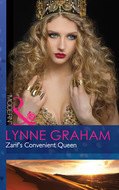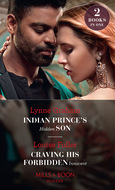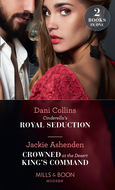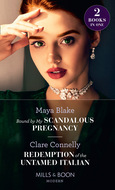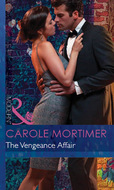Kitap dosya olarak indirilemez ancak uygulamamız üzerinden veya online olarak web sitemizden okunabilir.
Kitabı oku: «The Prince's Scandalous Wedding Vow»
She saved the merciless prince...
Now she must meet him at the altar!
When sweet scientist Josephine rescues a drowning stranger, she’s captivated by his devastating good looks and charm. Alexander doesn’t remember who he is, but the desire in his eyes sweeps innocent Josephine on an intensely passionate journey! Until it’s revealed he’s Prince Alexander, heir to the throne of Aargau... Now the threat of scandal means this shy Cinderella must become a royal bride!
Indulge in this deeply emotional royal romance!
New York Times and USA TODAY bestselling author JANE PORTER has written forty romances and eleven women’s fiction novels since her first sale to Mills & Boon in 2000. A five-time RITA® Award finalist, Jane is known for her passionate, emotional and sensual novels, and loves nothing more than alpha heroes, exotic locations and happy-ever-afters. Today Jane lives in sunny San Clemente, California, with her surfer husband and three sons. Visit janeporter.com.
Also by Jane Porter
A Dark Sicilian Secret
Not Fit for a King?
His Majesty’s Mistake
Bought to Carry His Heir
His Merciless Marriage Bargain
The Disgraced Copelands miniseries
The Fallen Greek Bride
His Defiant Desert Queen
Her Sinful Secret
Stolen Brides collection
Kidnapped for His Royal Duty
Discover more at millsandboon.co.uk.
The Prince’s Scandalous Wedding Vow
Jane Porter

ISBN: 978-1-474-08741-4
THE PRINCE’S SCANDALOUS WEDDING VOW
© 2019 Jane Porter
Published in Great Britain 2019
by Mills & Boon, an imprint of HarperCollins Publishers 1 London Bridge Street, London, SE1 9GF
All rights reserved including the right of reproduction in whole or in part in any form. This edition is published by arrangement with Harlequin Books S.A.
This is a work of fiction. Names, characters, places, locations and incidents are purely fictional and bear no relationship to any real life individuals, living or dead, or to any actual places, business establishments, locations, events or incidents. Any resemblance is entirely coincidental.
By payment of the required fees, you are granted the non-exclusive, non-transferable right and licence to download and install this e-book on your personal computer, tablet computer, smart phone or other electronic reading device only (each a “Licensed Device”) and to access, display and read the text of this e-book on-screen on your Licensed Device. Except to the extent any of these acts shall be permitted pursuant to any mandatory provision of applicable law but no further, no part of this e-book or its text or images may be reproduced, transmitted, distributed, translated, converted or adapted for use on another file format, communicated to the public, downloaded, decompiled, reverse engineered, or stored in or introduced into any information storage and retrieval system, in any form or by any means, whether electronic or mechanical, now known or hereinafter invented, without the express written permission of publisher.
® and ™ are trademarks owned and used by the trademark owner and/or its licensee. Trademarks marked with ® are registered with the United Kingdom Patent Office and/or the Office for Harmonisation in the Internal Market and in other countries.
Version: 2020-03-02
MILLS & BOON
Before you start reading, why not sign up?
Thank you for downloading this Mills & Boon book. If you want to hear about exclusive discounts, special offers and competitions, sign up to our email newsletter today!
Or simply visit
Mills & Boon emails are completely free to receive and you can unsubscribe at any time via the link in any email we send you.
For Lee Hyat.
Thank you for being my first reader, my friend,
and my cheerleader.
This one is for you!
Contents
Cover
Back Cover Text
About the Author
Booklist
Title Page
Copyright
Dedication
PROLOGUE
CHAPTER ONE
CHAPTER TWO
CHAPTER THREE
CHAPTER FOUR
CHAPTER FIVE
CHAPTER SIX
CHAPTER SEVEN
CHAPTER EIGHT
CHAPTER NINE
CHAPTER TEN
CHAPTER ELEVEN
Extract
About the Publisher
PROLOGUE
PRINCE ALEXANDER JULIUS ALBERICI had known change was coming. His June 27 wedding to Princess Danielle would require a return to his Mediterranean island kingdom, Aargau, for prewedding festivities. After the ceremony and reception, a two-week honeymoon had been planned, and then he’d finally be free to return to Paris with his bride, where he oversaw an international environmentalist group focused on improving sustainability in fragile ecosystems.
His work was his passion, and Danielle had expressed support for his work—a positive in an arranged marriage. She’d also agreed at the time of their betrothal to live wherever he chose, understanding that ultimately they’d end up in Aargau as soon as Alexander needed to step into his father’s shoes and ascend the throne.
But that day—replacing his father—was supposed to have been years away, decades away, as his father was a strong, athletic man and a vigorous, powerful king. Or he had been, until his winter cold lingered into early spring, a nagging cough that wouldn’t clear even with antibiotics. And then in mid-April came the diagnosis of lung cancer and now King Bruno Titus Alberici had been given months to live. Months.
It was unthinkable, unfathomable. Alexander had never been close to his father—King Bruno might be beloved by the people, but he was cold and unforgiving behind closed doors—yet Alexander couldn’t imagine the world without his fierce, unapologetic father. Now his father was determined to manage his death, just as he’d managed his life—without emotion or weakness. To that end, there would be no changes in palace life or protocol. Alexander’s late-June wedding would not be moved forward. Bruno’s illness would not be made public. There would be no changes in wedding date or venue. There would be no acknowledgment of ill health. There would be nothing to alarm the people until an announcement had to be made, which in King Alberici’s mind was notice of his death.
His mother, the queen, agreed with the plan because that was what she did—supported her husband. It had been her role from day one of their marriage, and she’d fulfilled her responsibilities. Now it was time for Alexander to fulfill his, which was to marry and have an heir so the monarchy would live on.
Alexander stirred restlessly, feeling trapped in his cabin, even though it was by far the largest on the ship. He pushed open the sliding door and stepped out onto the balcony, leaning on the railing to stare blindly out at the sea.
This trip, organized by his closest friends, had been a mistake. He couldn’t relax. He felt guilty being on a pleasure cruise when his father was growing weaker at home, and yet both his parents had insisted he go, determined that he keep up appearances.
The trip was to have been a last hurrah before the wedding preparations began in earnest. Princes didn’t do bachelor or stag parties, so instead, Prince Alexander Alberici’s best friend, Gerard, had organized a week cruising the Aegean and Ionian Seas. Troubled by his father’s swift decline, Alexander had left the details to his friends, knowing they were far more excited about this last adventure—concerned that it might indeed be their last adventure—but now wished he’d been part of the planning, at least when it came to approving the guest list.
The yacht itself was impressive. Large, new, and the very definition of luxurious, with two different pools, a hot tub, a sports court, a disco, and a movie theater. But the luxurious appointments couldn’t make up for the fact that it was a boat, and they were all trapped together—not a problem if everyone was on good terms, but inexplicably Gerard had permitted Alexander’s cousin, Damian Anton Alberici, to bring his girlfriend, Claudia, along.
It wouldn’t have been an issue if Claudia didn’t also happen to be Alexander’s ex-girlfriend, and their breakup six months earlier had been acrimonious at best. He’d been stunned and uncomfortable when he discovered Damian was now dating Claudia, but to bring her on this trip? Why make it awkward for everyone?
Alexander’s jaw tightened, his gaze narrowed on the pale rocky island ahead, each island so like the last.
The tension on the yacht just made him eager to return home, which was saying something as home wasn’t exactly pleasant, either. His mother was struggling to come to terms with his father’s terminal diagnosis. Virtually overnight his father had wasted away, his strong frame increasingly frail. The palace staff, sworn to secrecy, were incredibly anxious, tiptoeing around, walking on eggshells. And yet no one discussed what was happening. But that was because they didn’t talk in his family, not about personal things. There was no sharing of feelings and certainly no acknowledgment of emotions. There was only duty, and he understood that all too well.
The sooner the wedding took place, the better, and Princess Danielle Roulet would be a good match. She was lovely and well-bred, and fluent in numerous languages, which was essential in Aargau’s next queen. She was also sophisticated and would be a stylish princess, something he knew his people would appreciate. It was not a love match, but it would be a successful marriage because they both understood their duties and responsibilities, and best of all, the wedding would give the people of Aargau something to celebrate, which was sorely needed when the crown would soon change hands.
Now, if he could only get off this yacht and get back to his family—who did need him, despite what his parents might say, or not say—because Alexander was finding nothing pleasurable in this last bachelor getaway.
CHAPTER ONE
JOSEPHINE JUST WANTED the yacht to leave.
Why was it still here? The Mediterranean was huge. Greece alone had hundreds of islands. Couldn’t the yacht go somewhere else? The luxury pleasure boat had been anchored outside the cove of her tiny island, Khronos, for two days, and after forty-eight hours of endless partying, blaring music, and shrill laughter, she’d had enough.
The revelers had even come onto the island earlier in the day, their testosterone-fueled speedboat racing them to shore. Jo had hidden behind the cliffs and trees above, watching as the dozen hedonists descended on her beach.
The young women were stunning—tan, lithe, and beautiful in tiny, barely-there bikinis—and the men were lean, chiseled, and handsome. While the women splashed in the surf and then lounged on the beach, the men sprawled on chairs and towels in the sun, looking like indolent princes. They were there to party, too, and there was plenty of alcohol and other things that made Josephine wrinkle her nose in disgust. Only one of them didn’t drink, or smoke, or make love on the beach. Sometimes he sat on his own, but other times, people surrounded him. He was clearly the center of the group, the one with the wealth, the sun around which all the others orbited.
She watched the revelers out of curiosity and with a sprinkling of disdain, telling herself not to judge, but the interlopers on her beach clearly enjoyed a pampered, decadent lifestyle, a lifestyle for those born of privilege, or those lucky enough to be invited into the elite circle. Her dad used to say she was critical of such people because she’d never be one of them, and maybe there was some truth in that. But she liked to use her brain, and she enjoyed her work assisting her father, who was one of the world’s leading volcanologists, which was why they lived in the middle of the Aegean Sea, taking advantage of Greece’s volcanic arc.
Her work included documenting her father’s findings, and she’d proved indispensable to his research. He was the first to admit that he wouldn’t have his enormous body of work without her assistance. But late in the day, she’d turn to her passion—drawing, sketching, painting. She had run low on paper and canvas again, but her father would be returning in ten days, and he always brought back fresh supplies for her.
This afternoon she carried her sketch pad with her to the rocks overlooking the sheltered beach cove, thinking she’d draw the scene below—well, not everyone, but the one who’d caught her attention. The one man she thought was by far the most fascinating. He appeared otherworldly with his thick dark hair and straight black brows over light-colored eyes—blue or gray she didn’t know. But even from a distance the lines of his face appealed to the artist in her: his jaw was square, cheekbones high, his mouth full, firm, unsmiling.
Her charcoal pencil hovered over the page as she studied the face she’d drawn. His features were almost too perfect, his lower lip slightly fuller than his upper lip, and she just wished she was closer so she could see the color of his eyes.
Even more intriguing was the way he sat in his chair, broad shoulders level, chin up, body still, exuding power and control. Josephine glanced up from the sketch to compare her work to the real man, and yes, she’d captured the sinewy, muscular frame as well as the hard set of his jaw and chin, but his expression wasn’t quite right. It was his expression that intrigued her and made her want to keep looking at him and trying to understand him. Was he bored, or unhappy? Why did he look as if he wanted to be anywhere but on that beach, with these people?
He was a mystery, and she enjoyed a good puzzle. It gave her mind something to focus on, but now he was rising, and everyone else was rising, gathering their things and heading to the boat.
Good, she told herself, closing her sketchbook, and yet she couldn’t help feeling a stab of disappointment as the speedboat whisked her mystery man back to the massive yacht anchored outside her cove, because he was, without a doubt, the most interesting man she’d ever seen, and now he was gone.
Later that evening, Josephine was returning from doing her last check of the equipment in the cottage when she heard loud voices, as if in argument, from just outside the cove. She crossed to the beach, listening intently, but this time she heard nothing, just the sound of the yacht engine humming. Was the yacht finally leaving?
As usual, it was brightly lit and pulsing with music. On the top deck she could see couples lounging and drinking. There were others on a deck below and then others at the far end of the yacht, in the shadows.
The yacht was moving. She could see the moonlight reflecting off the white wake. She was sorry to see her mystery man leave, but glad the noise would be gone. The music was terrible. She was still standing there when she heard a muffled shout and then saw someone go overboard. It was at the back of the yacht, where people had been on a lower deck in the shadows.
She rushed closer to the water’s edge, attention fixed on the point where the person had gone into the water, but no one resurfaced. Sick, panicked, Josephine worried that someone could be drowning. She couldn’t just stand idle while someone died.
She yanked off her sundress and dived between the waves to swim out to where the yacht had been anchored for the past two and a half days. Diving beneath the surface of the water, she struggled to see in the gloom, but all was dark, so dark, and the reef dropped off dramatically not far from her, the coral giving way to deep water. Josephine swam with her hands in front of her, searching, reaching, lungs burning, bursting, and just when she was going to push back to the surface, she felt fabric, and then heat. A chest. Shoulders. Big, thick shoulders. A man.
She prayed for help as she circled his neck with her arm, hoping for divine strength because she needed superpowers in that moment, her own lungs seizing, desperate for air.
With a groan, she pulled up and he rose with her. Not quickly, but he was floating as she swam, his huge body heavy, but she’d never swum with such resolve. She’d grown up in the ocean. She’d spent her life swimming, deep, exploring caves and the reef, and even though spots danced before her eyes she told herself she could do this because she wasn’t alone. She had faith that she was meant to be there when the body fell overboard, and she was meant to find him, and she was meant to save him.
And she did.
She surfaced and, gasping for air, towed him to shore. Once she’d dragged him out of the waves, she kept pulling, hoping she wasn’t hurting him as she wrestled him onto the firm damp sand. Once she knew they were out of the surf, she rolled him onto his side, allowing water to drain from his mouth and nose, before settling him onto his back. It was only then she realized it was him.
The beautiful brooding man.
The one who’d barely seemed to tolerate the others.
The one who suffered no fools.
She’d never had to resuscitate anyone before, but her father had taught her years ago, and she remembered the basics, although guidelines kept changing every year or two. She pinched his nose closed and then breathed into his mouth with five strong breaths, followed by thirty chest compressions. She put her ear near his mouth and listened. Nothing. She heard nothing. She repeated the cycle with two strong breaths into his mouth and another thirty compressions. After each cycle, she listened and watched his chest, checking for signs of life.
She wouldn’t give up. Breathe, breathe, breathe, she chanted in her head, repeating the cycle, praying as she did, asking for divine help, not at all prepared to lose him.
Breathe, breathe, breathe.
Live, live, live.
Just when she was sure her efforts were pointless, his chest lifted—not much, but it moved, and it was enough to give her hope. Determined, Jo breathed into his mouth, those two strong breaths, and this time she felt air exhale from his lips and saw a definite rise and fall of his chest. His breath was rough and raspy, but it was a breath. It wasn’t her imagination. He was alive.
Her eyes stung with tears. Her hands began to shake as she shoved her long, wet hair behind her ears, overwhelmed and exhausted. The sheer enormity of it all hit her, and she sat back on her heels, shoulders sagging. She’d saved him. But now what? What was she to do with him?
Her adrenaline faded, and she began trembling in earnest, wiped out. She didn’t know how she’d managed any of it. She was a good swimmer, a strong swimmer, but it was a miracle she’d been able to find him and pull him to the shore. He needed medical help, and she had no way to call for assistance. Her radio was broken. Her dad would be bringing a new one when he returned, but that wasn’t for days. Ordinarily, she wouldn’t mind being cut off—she’d gone weeks before without communication—but this was different.
Her brow creased as she glanced out toward the sea, the mouth of the cove empty, the moonlight reflecting brightly on the water, the only sign of the yacht a distant glow of yellow light on the horizon.
How did no one notice that he’d gone overboard? How could they go without him?
Gently, she stroked his hair back from his brow, only then noting the blood matting the thick hair at his temple. He was injured, and from the nasty gash on his forehead, he’d been injured before he’d fallen—or been pushed—overboard.
She’d heard raised voices. She’d heard a fight. It was what had drawn her attention—that and the hum of the yacht engine. From the mark on his brow it looked as if someone had struck him. Why?
* * *
He blinked, trying to focus. His head hurt. Pain radiated through him. He struggled to sit but the world tilted and swam around him. He blinked again, not understanding why everything was so blurry. It was almost as if he was underwater and yet, through the haze, he saw a woman leaning over him, her face above his, her expression worried.
He struggled to place her. How did he know her? Did he know her?
The effort to think was too much. He gave up trying to focus and closed his eyes, sinking back into oblivion.
Pain woke him again.
A heavy, brutal pounding in his head made him stir, his eyes slowly, carefully opening, trying to minimize the ache in his head.
It was day, either early or late he didn’t know because the light was soft, diffused.
A woman was moving around the room. She wore a loose white dress, the gauzy fabric fluttering around her bare legs. She paused at the small square window, her brow creasing as she gazed out. Her hair was long and straight, falling almost to her waist.
For a moment he wondered if she was an angel. For a moment he wondered if he had died and gone to heaven. Not that he deserved to go to heaven. Strange thought, but true. He struggled to rise but immediately felt nauseous.
Biting back a curse, he slowly sank back against the pillow, realizing he wasn’t dead—or at least, he wasn’t in heaven. He couldn’t be, not if he hurt this much.
His muffled groan must have reached the angel girl, as she turned in her white dress, the delicate fabric floating behind her as she moved toward him, so young, so beautiful he was certain she wasn’t real.
Perhaps he was feverish. Perhaps he was hallucinating, because as she knelt next to him, the sun’s rays seemed to narrow and cast a glow around her, highlighting her long golden-brown hair, her smooth brow, and the high, elegant cheekbones above her full lips.
Maybe hell was filled with angelic beauties.
* * *
He was finally coming to. Josephine moved forward, crouching at his side. “Hello,” she said in English, before it struck her that it was unlikely English was his native language. Most of the conversation she’d heard on the beach had been French, while others had spoken Italian. “How are you?” she asked in French.
He blinked and struggled to focus, his eyes a brilliant blue, contrasting with his long, dense black lashes.
She tried Italian next. “How do you feel?”
His brow tightened. He grimaced, responding in Italian. “Tu chei sei?” Who are you?
“Josephine,” she answered, as he slowly reached up to touch his head, where a crust had formed on his cut. “Careful,” she added in Italian. “You’ve been injured. It’s finally stopped bleeding.”
“What happened?”
“You went over the side of your yacht.”
“A yacht?” he repeated in Italian.
“Yes. You were with friends.”
“Dove sono?” he murmured, his voice a deep rasp. Where am I?
“Khronos. A small island off Anafi,” she answered.
“I don’t know it.”
“Anafi is very small. No one knows Anafi, and Khronos is even smaller. It’s privately held, a research site for the International Volcanic Research Foundation—” She broke off as she realized he wasn’t listening, or at least, he wasn’t processing what she was saying, his features tight with pain. “Do you hurt right now?”
He nodded once. “My head,” he gritted.
She reached out to place a palm against his brow. He was cooler now, thank goodness. “You were running a fever last night, but I think it’s gone now.” She drew her hand back, studying him. “I’d like to see if you can manage some water, and if you can, then we’ll try some soup—”
“I’m not hungry. I just want something for the pain.”
“I have tablets that should help with the headache, but I think you should eat first. Otherwise I’m worried it’ll upset your stomach.”
He looked at her as if he didn’t understand, or perhaps he didn’t believe her, because his blue eyes were narrowing and his mouth firmed, emphasizing his strong jaw, now shadowed with a dark stubble.
He’d been striking from afar, but up close he was absolutely devastating, his black hair and brows such a contrast to his startlingly blue eyes. His features were mature and chiseled. Faint creases fanned from his eyes.
As his gaze met hers and held, her pulse jumped. “It’s been almost a full day since I pulled you out of the sea—”
“How?” he interrupted.
“How?” she repeated.
“How did I get here?”
“Your boat. Your yacht—”
“I don’t understand this yacht.” The wrinkles in his forehead deepened. He struggled into a sitting position, wincing and cursing under his breath. His hand lifted to his temple, where the wound was beginning to bleed again. “When was I on one?”
“The past few days. Probably the past week or more.” She sat back on her haunches, studying him. “Do you not remember?”
He shook his head.
“What do you remember?”
He thought for a moment, and then his broad, sun-bronzed shoulders shifted irritably, impatiently. “Nothing.” His voice was hard, his diction crisp. Authority and tension crackled around him.
Her jaw dropped ever so slightly. “You don’t remember who you are? Your name? Your age?”
“No. But I do know I need to find a bathroom. Can you show me the way?”
* * *
He had questions for her later, many questions, and Josephine fought to hide her anxiety over his complete loss of memory. She prepared them a simple dinner, talking to him as she plated the grilled vegetables and lemon-garlic chicken. “I think you must be Italian,” she said, carrying the plates to the small rustic table in the center of the room. The table divided the room, creating the illusion of two spaces, the sitting area and then the kitchen. “It was the first language you responded to.”
“I don’t feel Italian.” He grimaced. “Although I’m not sure what that even means. Can a person feel their nationality?”
“I don’t know,” she answered, sitting down across from him. “But I suppose if I woke up somewhere else I’d be puzzled by the different cultural norms.”
“Tell me about the people I was with.”
“They were all about your age. Although some of the girls seemed younger. They all looked...polished. Affluent.” She hesitated. “Privileged.”
He said nothing.
“Everyone seemed to be having a good time,” she added. “Except for you.”
He glanced at her swiftly, gaze narrowing.
“I don’t know if you were bored, or troubled by something,” she added, “but you tended to be off on your own more than the others. And they gave you your space, which made me think you were perhaps the leader.”
“The leader?” he repeated mockingly. “The leader of what? A band of thieves? Pirates? Schoolboys on holiday?”
“You don’t need to be rude,” she said slowly, starting to rise, wanting to move away, but he reached out and caught her, his fingers circling her narrow wrist, holding her in place.
“Don’t go.”
She looked down to where his hand wrapped her wrist, his skin so very warm against hers. She suppressed a shudder, feeling undone. She was exhausted from watching over him, exhausted from worrying. It had been a long night and day, and now it was night again and she felt stretched to the breaking point. “I’m just trying to help you,” she said quietly, tugging free.
He released her. “I’m sorry.” His deep voice dropped. “Please sit. Stay.”
His words were kind, but his tone was commanding. Clearly he was accustomed to being obeyed.
Her brow furrowed. She didn’t want to create friction, and so she slowly sat back down and picked up her fork, but she felt too fatigued to actually eat.
Silence stretched. She could feel him watching her. His scrutiny wasn’t making things easier, and she knew his eye color now. Blue, light, bright aquamarine blue. Blue like her sea. Reluctantly, she looked up, her stomach in knots. “I thought you were hungry,” she said, aware that he hadn’t yet taken a bite, either.
“I’m waiting for you.”
“I’ve lost my appetite.”
“The company you’re keeping?”
She cracked a small smile. “The company’s fine. I think I’m unusually tired tonight.”
“I suspect you were up all night worrying about me.”
It was true. She hadn’t been sure he’d survive. There were complications for those who’d nearly drowned. “But you made it through, and here you are.”
“Without a memory, or a name.”
“I suppose we should call you something.”
“Perhaps,” he said, but it was clear from his tone that he didn’t agree and wasn’t enthusiastic about being called by a name that was probably not his.
“We could try names out, see if anything resonates.”
He gave her a long, hard look that made her stomach do a funny little flip. “I’ll say names and you tell me if anything feels right,” she pressed on.
“Fine.”
“Matthew. Mark. Luke. John.”
“I’m fairly certain I’m not an apostle.”
Her lips twitched. “You know your Bible stories, then.”
“Yes, but I don’t like this approach. I want my own name, or no name.” He stabbed his fork into his dinner but made no attempt to eat. “Tell me about you,” he said, turning the tables. “Why are you here on what appears to be a deserted island?”
“Well, it’s not deserted—it’s an island that serves a scientific purpose, housing one of the five research stations for the International Volcano Foundation. My father is a professor, a volcanologist. We were supposed to be here for a year but it’s been almost eight.”

